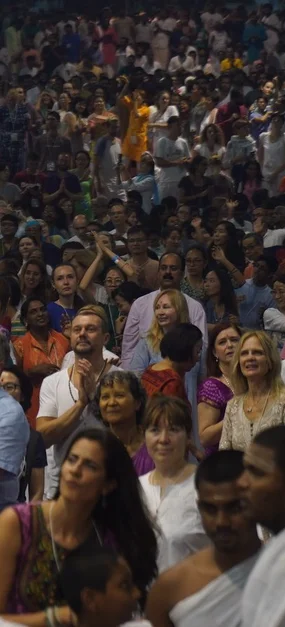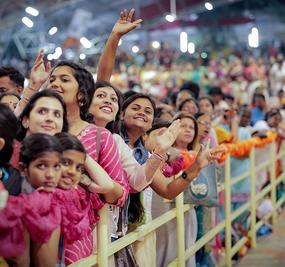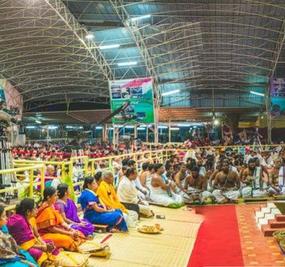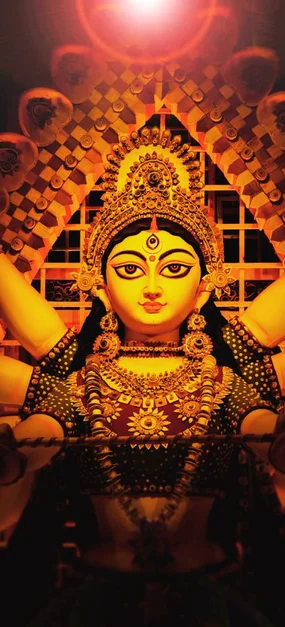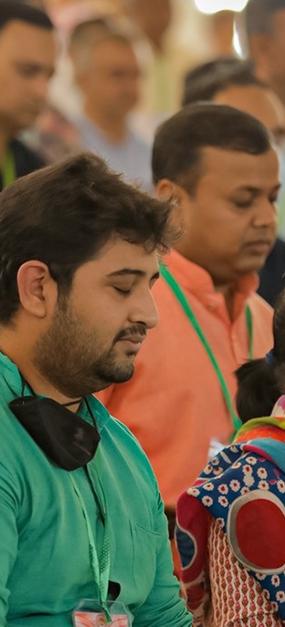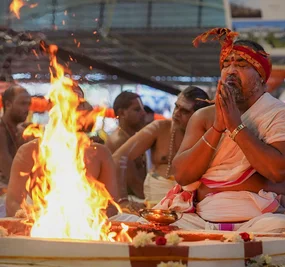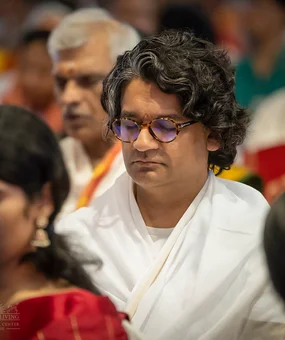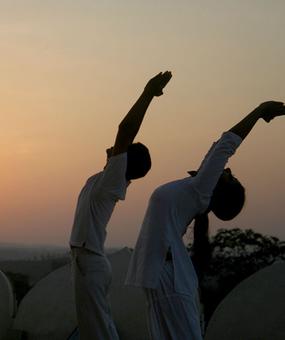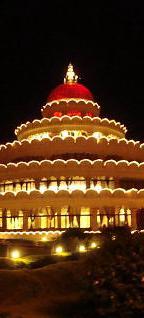Smt. Bhanumathi Narasimhan (Bhanu di as she is fondly called), Chairperson of Women’s Welfare and Child Care programs of The Art of Living, is the venerable sister of global spiritual master, Gurudev Sri Sri Ravi Shankar, shares fond Navaratri memories in a conversation with Bharathy Harish. Managing Partner, Madhurya, a sustainable fashion brand that is reviving lost traditional weaves while supporting free education for the lakhs of underprivileged children in India.
A bright afternoon in August – it was a comfortable, calm and content atmosphere at Bhanu Didi’s house. It was time to get ready for a session for another Art of Meditation (Sahaj Samadhi) Course. “I’ll change and come,” she said. It is always a pleasure to wait for that moment of ‘wow’ when she steps out in a resplendent saree with an all-charming and graceful smile. Today was no different.
She steps out in a bright maroon saree with simple gold zari, mallige (jasmine flower garland) in her hair, ornate earrings in her ears, and maroon bindi (a little red dot) on her forehead. “Akka (elder sister), you look like it’s Navratri already!”
“Even I felt that way,” she says.
One who has experienced Navratri in the presence of Gurudev, cannot forget the experience. Just the memory of Navratri celebrations at The Art of Living International Center takes one to a space within, which is so full of joy and wonder. Who better to tell us about this beautiful and divine celebration than Bhanu Di.
I start off by asking her, “So, what is Navratri?”
Navratri Pujas and Mantra Chanting Create a Divine Atmosphere

“Navratri is nine nights of celebration. As Gurudev says, the first three days of Navratri are tamasic (lethargic, dull and heavy) the following three days are rajasic (restlessness) and the last three days are sattvic (described by purity and high prana or energy.) The nine days represent the nine months a baby spends in a mother’s womb. During Navratri, our consciousness evolves every day from tamas to sattva, from delusion to awakening.”
Bhanu Di further explains, “In life, there are positive and negative (qualities) around us. Navratri represents how the negativity in life can be conquered by inherent, positive divine qualities present in every individual, elevating them from mere ordinary mortals to the height of divine beings. During this time one can experience this progressive ascension. The mantras chanted during the pujas create positive vibrations, more so in the presence of our Master. This is the beauty of attending Navratri pujas in the ashram (The Art of Living International Centre in Bangalore).”
Suddenly she breaks away from our discussion, “Chiku (her pet dog), go inside! Vijay Bhaiya, kaun aaya hai, dekho (Vijay, please see who’s at the door),” and just as smoothly continues,
“The puja represents everything…”
We are interrupted many times.
One would think that the flow of our conversation would be disturbed and that she should not be interrupted while giving the interview, but it does not bother her at all. She moves in and out of the inner and outer worlds with such effortless grace. Is this what integration of knowledge in our lives means?
“For the past 25 years I have seen the puja in the ashram. It is an integral part of the ashram culture. Even then it used to be the same in all its grandeur” Bhanu Didi says.
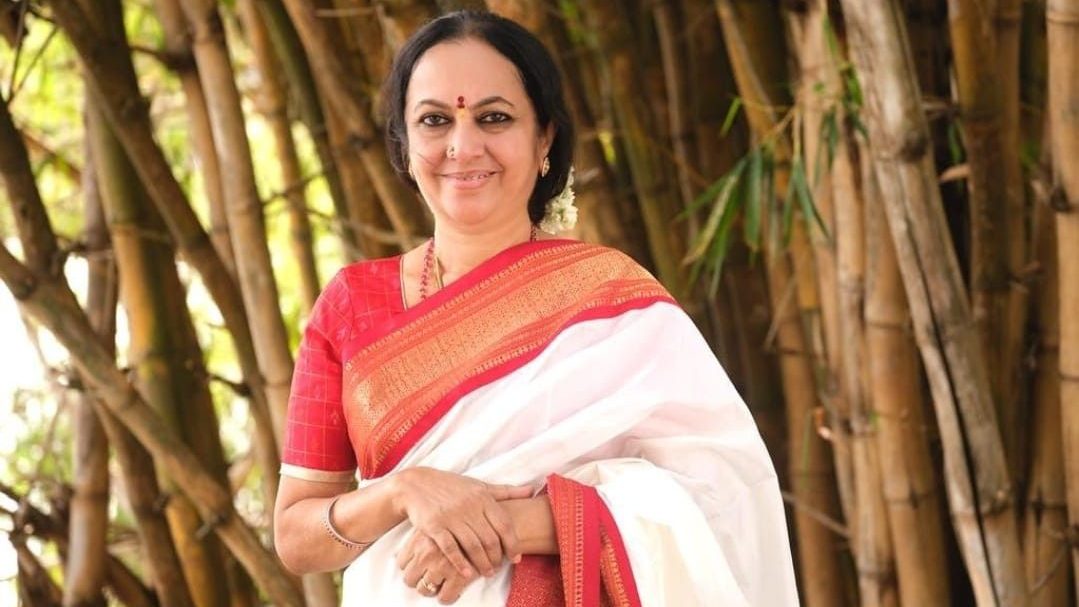
“Puja caters to the mind, body and spirit. For the body, there is dance and music. (She swings as she speaks, I thought she may just get up and start dancing – her voice is so musical anyway!). All the colour and splendour we see is the celebrative aspect of Navratri. Through outer beauty we can get in touch with inner beauty. It also symbolizes the richness of our culture and heritage. This feast for our eyes uplifts our mood and spirit. We are influenced by our moods, so when a divine atmosphere gets created through celebration, our mood is also uplifted,” Bhanu Di explains.
“Mood is the correct word, no?” she asks sweetly.
I agree with her. When Gurudev speaks, what he says moves one to a space of wonder. But it is also a wonder how Gurudev expresses the deepest knowledge so simply – in so few words. The way Bhanu akka explained Navratri, gave me the same feeling.
Navratri Pujas at Ashram – Then and Now
“For the past 25 years, I have seen the puja in the ashram. It is an integral part of the ashram culture. Even then it used to be the same in all its grandeur, but on a much smaller scale. Now the Navratri pujas have gained a multitude of dimensions because of the sheer number of people who attend and participate. But it is as beautiful and divine now as it was then. Whether in a big or small crowd, our inner space is always a vast space – Chidambaram. When you close your eyes, you are transported to that same space in the presence of the Master. The true essence of this puja has remained the same through the years because puja makes one go inward and discover this vastness. That is the real beauty of this puja, but the magnitude now is truly beautiful and amazing.”
“Hi Yeshaswini, aao idhar baito”, she picks up the 2-year-old baby girl and makes her sit on the swing next to her. She points at the animal chart in her hand and says “Lion, say Liiiiiooooon”. “LLLIOON KIIIIIINGG” replies the little girl. “The little one seems to know her animals very well!” Didi’s eyes become wide with joy and she bursts into laughter!
Navratri Celebrations Have Something for Everyone
Didi continues, “Navratri in the ashram is like one of the most widely participated family functions for us. Everybody feels special and welcome. Family members from all generations attend, from the older and younger generations to the youngest of children, there is something for everyone. There is Dhampathi Puja for old couples, Kanya Puja for young girls, Vatu Puja for boys, Sumangali Puja for married women. You feel a sense of belongingness and connection.”
Why, there is even Gau Puja for the cows and Gaja Puja for the elephants, and even the animals are included- “We honour everything in creation. In fact, during Ayudha Puja, even buses, cars, bicycles and even tools are honoured and worshipped for their contribution to our existence and comfort,” she explains appreciatively.
“Diverse people come here – they sit, sing, dance and meditate together. It is a divine atmosphere. It is an atmosphere of celebration, love and gaiety – and of course, we get lots of nice things to eat and a lot of opportunity for seva! So basically these are the days for introspection and a chance to learn from one another. Every year this celebration seems to become bigger and bigger as our family grows. It is truly a magical and enlivening experience,” Bhandu Didi shares.
Why Everyone Must Visit The Art of Living International Center During Navaratri?
“During Navratri in the ashram, everything is transposed to a different dimension. It takes you to an elevated consciousness. It is all so upbeat – there is so much celebration and happiness. You must come and sit and watch. One must attend to understand the value of it. Many people have reported miracles that have taken place at that time. Because it is such a positive atmosphere, any sankalpa you take definitely gets fulfilled. From the heart level you are soaked in divinity. Divya sagar mein doob jaana hai, bhav sagar mein nahin (drown in the ocean of divine consciousness, not in negative emotions), and you become a lighthouse of divinity,” Bhanu Didi nods her head gently.
The secrets of Navratri have been shared. Now it is up to us to ensure that we experience it at the Art of Living International Centre in Bangalore.



